Unit 5 Art world Reading 1: Tan Dun’s music 课件18张
文档属性
| 名称 | Unit 5 Art world Reading 1: Tan Dun’s music 课件18张 | 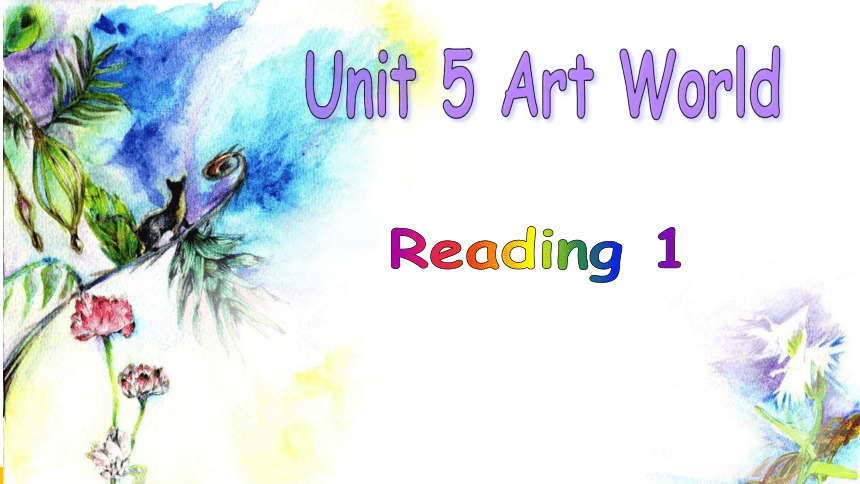 | |
| 格式 | pptx | ||
| 文件大小 | 2.6MB | ||
| 资源类型 | 教案 | ||
| 版本资源 | 牛津译林版 | ||
| 科目 | 英语 | ||
| 更新时间 | 2020-10-01 19:42:01 | ||
图片预览

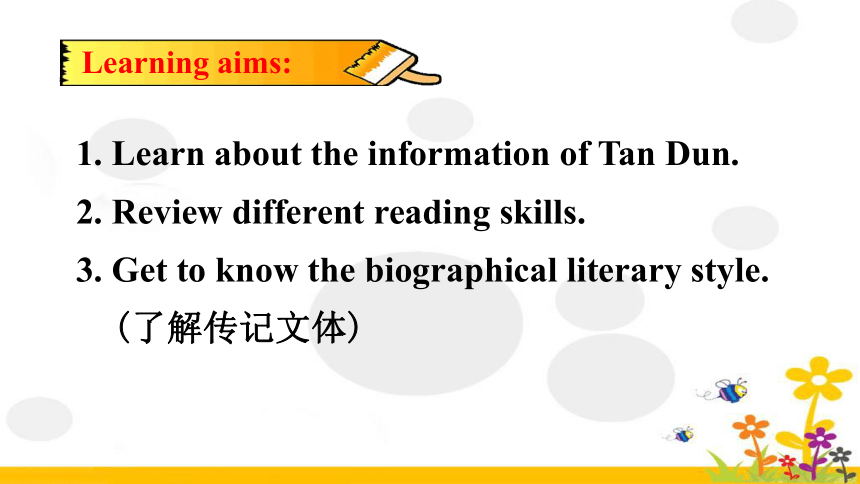
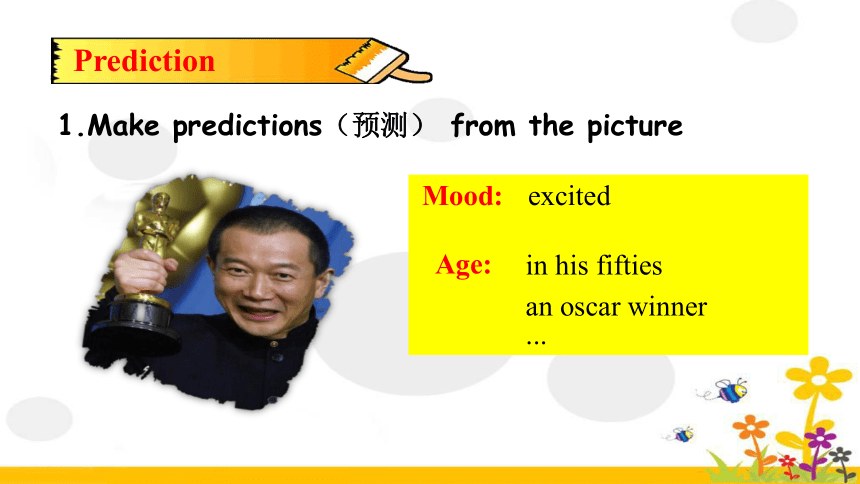
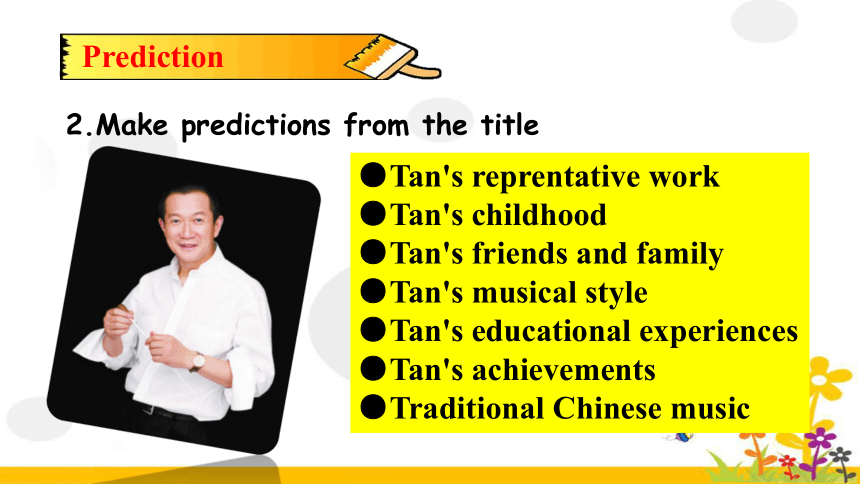
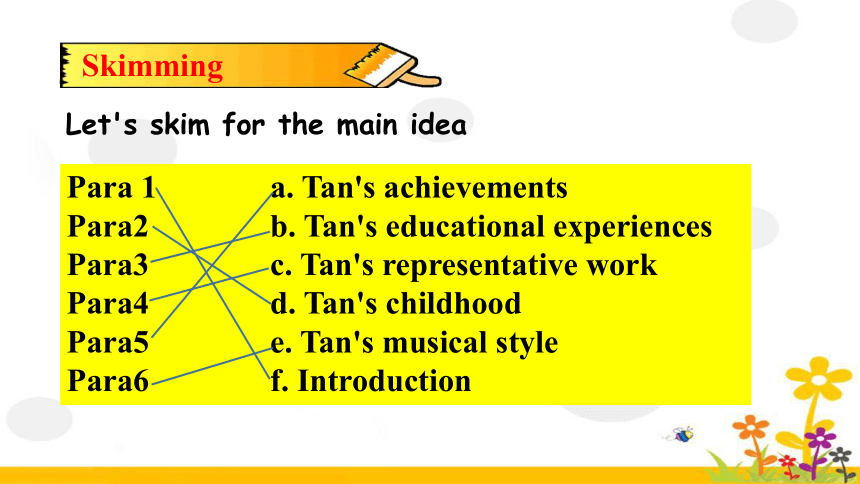
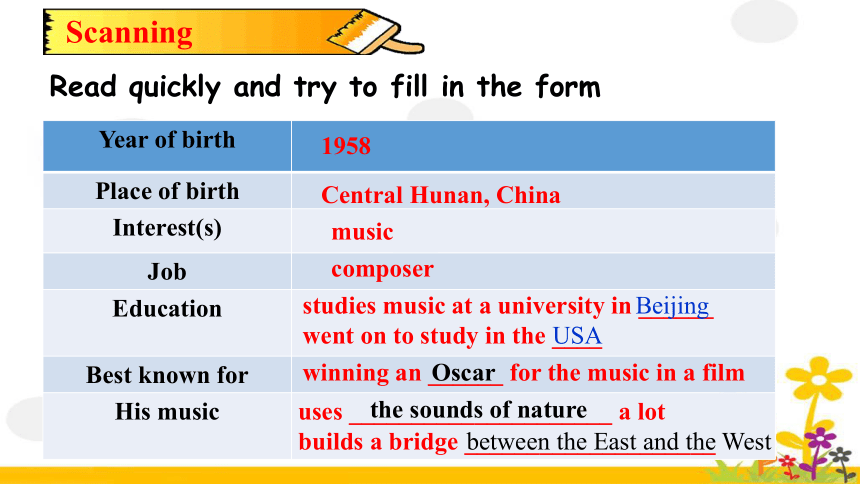
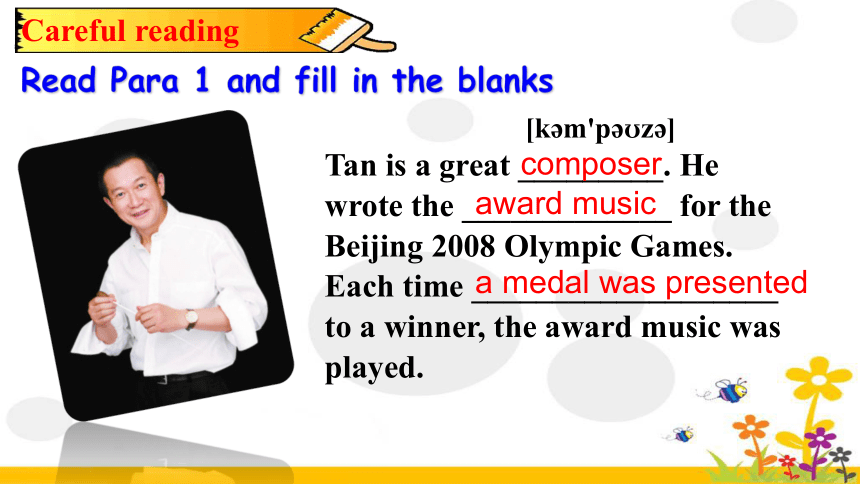
文档简介
Reading 1
1. Learn about the information of Tan Dun.
2. Review different reading skills.
3. Get to know the biographical literary style.
(了解传记文体)
Learning aims:
Mood:
Age:
1.Make predictions(预测) from the picture
Prediction
excited
in his fifties
an oscar winner
...
Prediction
2.Make predictions from the title
●Tan's reprentative work
●Tan's childhood
●Tan's friends and family
●Tan's musical style
●Tan's educational experiences
●Tan's achievements
●Traditional Chinese music
Skimming
Let's skim for the main idea
Para 1 a. Tan's achievements
Para2 b. Tan's educational experiences
Para3 c. Tan's representative work
Para4 d. Tan's childhood
Para5 e. Tan's musical style
Para6 f. Introduction
Scanning
{5C22544A-7EE6-4342-B048-85BDC9FD1C3A}Year of birth
Place of birth
Interest(s)
Job
Education
Best known for
His music
uses _____________________ a lot
builds a bridge ____________________
Read quickly and try to fill in the form
1958
Central Hunan, China
music
composer
studies music at a university in ______ went on to study in the ____
Beijing
USA
winning an ______ for the music in a film
Oscar
the sounds of nature
between the East and the West
Careful reading
Read Para 1 and fill in the blanks
Tan is a great _________. He wrote the _____________ for the Beijing 2008 Olympic Games. Each time ___________________ to a winner, the award music was played.
composer
award music
a medal was presented
[k?m'p??z?]
Read Para 2 and choose
Careful reading
What shows Tan's special interest in music?
A. He loves the sounds of rushing water.
B. He loves the sounds of blowing wind.
C. He makes many musical instruments.
D. He often swims in the Liuyang River.
E. He makes music with common objects like stones and paper.
Line 10 on Page 66
Since he had no music instruments then, he made music with
common objects like stones and paper.
*According to the context(上下文).
*According to the words before or after the new words.
How to guess the meaning of a new word?
1.in 1978
studied music at a university in ________
2.eight years later
went on to study _____________ ,
got to know great ___________from around the world.
in the USA
musicians
Beijing
Careful reading
Read Para 3 carefully and find out Tan’s education experiences.
Education
experiences
Line 14 on Page 66
There he got to know great musicans from around the world.
How to guess the meaning of a new word?
*According to the root word(词根),the prefix or the suffix.
{72833802-FEF1-4C79-8D5D-14CF1EAF98D9}Why is Tan Dun’s music special?
Reason
uses a lot of _________________in his music __________ musical instruments,
and they________ different pictures in different minds.
Example
makes _____than 50 sounds from water by _________ the speed of water flow
sounds of nature
instead of
more
create
controlling
Read Para 4 carefully and fill in the blanks.
Careful reading
What's the meaning of Tan's words?
“My music is to dream without boundaries.”
It means Tan in his music.
Careful reading
Read Para 5-6 carefully and think over
mixes different types of music together
the East
bridge
the past
common objects
Music without boundaries
traditional Chinese music
the West
the present
musical instruments
modern Western music
M
I
X
Reading
Group work: Make an interview.
Post-reading
S1: Hello, Mr.Tan. We're glad to have an interview with you.
T: Thanks for your invitation.
S2: Ok, let's start.... (Choose 1-2 questions)
1)Were you born in central Hunan?
2)What did you use to make music when you were young?
3)When did you go to the USA?
4)What are you best known for?
5)What do you mean by saying that "My music is without boundaries"?
6)...
T: ...
S3:Thank you for coming and helping us learn about Tan.
Sample:(Tan Dun—T;students—S)
Tan Dun is a success.
What is needed, if we teenagers hope for success?
Never give up
Interest
creative
hard-working
You can do
almost anything
if you never give up!
1. Listen to the tape, read the text over and over again.
2. Introduce Tan Dun to your friends.
3. Finish off the relevant exercises.
Homework
Thank you for listening!
Thank you for listening
1. Learn about the information of Tan Dun.
2. Review different reading skills.
3. Get to know the biographical literary style.
(了解传记文体)
Learning aims:
Mood:
Age:
1.Make predictions(预测) from the picture
Prediction
excited
in his fifties
an oscar winner
...
Prediction
2.Make predictions from the title
●Tan's reprentative work
●Tan's childhood
●Tan's friends and family
●Tan's musical style
●Tan's educational experiences
●Tan's achievements
●Traditional Chinese music
Skimming
Let's skim for the main idea
Para 1 a. Tan's achievements
Para2 b. Tan's educational experiences
Para3 c. Tan's representative work
Para4 d. Tan's childhood
Para5 e. Tan's musical style
Para6 f. Introduction
Scanning
{5C22544A-7EE6-4342-B048-85BDC9FD1C3A}Year of birth
Place of birth
Interest(s)
Job
Education
Best known for
His music
uses _____________________ a lot
builds a bridge ____________________
Read quickly and try to fill in the form
1958
Central Hunan, China
music
composer
studies music at a university in ______ went on to study in the ____
Beijing
USA
winning an ______ for the music in a film
Oscar
the sounds of nature
between the East and the West
Careful reading
Read Para 1 and fill in the blanks
Tan is a great _________. He wrote the _____________ for the Beijing 2008 Olympic Games. Each time ___________________ to a winner, the award music was played.
composer
award music
a medal was presented
[k?m'p??z?]
Read Para 2 and choose
Careful reading
What shows Tan's special interest in music?
A. He loves the sounds of rushing water.
B. He loves the sounds of blowing wind.
C. He makes many musical instruments.
D. He often swims in the Liuyang River.
E. He makes music with common objects like stones and paper.
Line 10 on Page 66
Since he had no music instruments then, he made music with
common objects like stones and paper.
*According to the context(上下文).
*According to the words before or after the new words.
How to guess the meaning of a new word?
1.in 1978
studied music at a university in ________
2.eight years later
went on to study _____________ ,
got to know great ___________from around the world.
in the USA
musicians
Beijing
Careful reading
Read Para 3 carefully and find out Tan’s education experiences.
Education
experiences
Line 14 on Page 66
There he got to know great musicans from around the world.
How to guess the meaning of a new word?
*According to the root word(词根),the prefix or the suffix.
{72833802-FEF1-4C79-8D5D-14CF1EAF98D9}Why is Tan Dun’s music special?
Reason
uses a lot of _________________in his music __________ musical instruments,
and they________ different pictures in different minds.
Example
makes _____than 50 sounds from water by _________ the speed of water flow
sounds of nature
instead of
more
create
controlling
Read Para 4 carefully and fill in the blanks.
Careful reading
What's the meaning of Tan's words?
“My music is to dream without boundaries.”
It means Tan in his music.
Careful reading
Read Para 5-6 carefully and think over
mixes different types of music together
the East
bridge
the past
common objects
Music without boundaries
traditional Chinese music
the West
the present
musical instruments
modern Western music
M
I
X
Reading
Group work: Make an interview.
Post-reading
S1: Hello, Mr.Tan. We're glad to have an interview with you.
T: Thanks for your invitation.
S2: Ok, let's start.... (Choose 1-2 questions)
1)Were you born in central Hunan?
2)What did you use to make music when you were young?
3)When did you go to the USA?
4)What are you best known for?
5)What do you mean by saying that "My music is without boundaries"?
6)...
T: ...
S3:Thank you for coming and helping us learn about Tan.
Sample:(Tan Dun—T;students—S)
Tan Dun is a success.
What is needed, if we teenagers hope for success?
Never give up
Interest
creative
hard-working
You can do
almost anything
if you never give up!
1. Listen to the tape, read the text over and over again.
2. Introduce Tan Dun to your friends.
3. Finish off the relevant exercises.
Homework
Thank you for listening!
Thank you for listening
